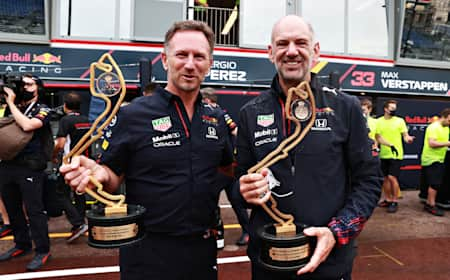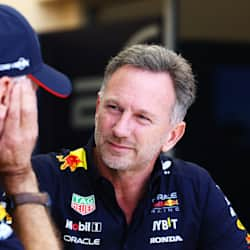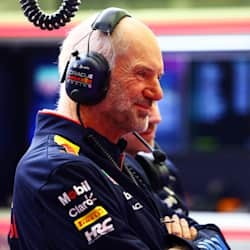Red Bull Motorsports

F1
How Christian Horner and Adrian Newey led Red Bull to F1 glory
Oracle Red Bull Racing’s team principal and chief technical officer talk about everything from titles and triumphs to learning from losing and how their partnership began.
Rewind to 2005, and Christian Horner was a first-time Formula One team principal at a new team called Red Bull Racing, competing in the world championship for the first time. Horner was F1-green and the team was unproven, but he knew what he needed. Or more specifically, who he needed: Adrian Newey.
"What was missing was a clear technical direction," Horner says.
"Adrian was the very best that's ever been in Formula One, so it was a question of how could we entice, how could we attract Adrian to join the Red Bull team?"
By 2005, Newey had a deserved reputation as F1's foremost engineering brain, his early days at Leyton House in 1990 leading to title-winning technical director roles at Williams and then McLaren. So Horner put his best foot forward, quite literally one after the other. In that 2005 season, Horner would invariably pop up just as Newey was showing up for work at tracks around the world, as Newey remembers.
"Christian made a habit through the 2005 season that I would be walking into the paddock, I think Silverstone has the clearest memory, he always happened to be walking," says Newey with a laugh.
"There was another chance interchange and we started to talk a bit more. And then this gentleman in a black leather jacket suddenly popped out from behind a truck and said, 'I'm Helmut Marko, here is my card. We will ring.'"
The way things were: Horner and Newey show up for work in the early days
© Getty Images/Red Bull Content Pool
As history shows, Dr Marko did ring, Newey did join Horner at Red Bull Racing and from those first fledgling steps, the journey from new boys to world champions – and the road back again after eight years – has been the team's F1 story.
It's a story that, in 2022, culminated in the team's first double world title success since 2013, with Max Verstappen annexing his second straight drivers' world championship, and Sergio Pérez playing a crucial part in the team winning the constructors' championship for a fifth time.
In a revealing sit-down interview with British sports journalist and TV presenter Laura Winter, Oracle Red Bull Racing's two most senior figures reflected on the origins of their professional relationship, how working together for a common goal formed a bond and how successes – plus the lean times in between – have shaped the team into a modern-day F1 powerhouse.
Central to that story is 13-time Grand Prix winner David Coulthard, who Newey knew well from the time 'DC' spent at Williams and McLaren, and who was Horner's lead driver for that first F1 season in 2005. Coulthard convinced Newey that, behind Red Bull's reputation as a 'party team', a serious, well-funded, ambitious and hungry group of racers desperate for success lay within.
"David's a good friend, somebody whose judgment I very much trusted, and David gave it a big thumbs-up," Newey remembers.
"[Red Bull Racing] was always having big discos – was this a team that would be taken seriously? But if you went beneath that veneer, then to me it looked like, yes, it had all the building blocks."
Those blocks started to build something big when Sebastian Vettel replaced the retiring Coulthard for the 2009 season, having already won a Grand Prix for Red Bull's sister team Scuderia Toro Rosso (now Scuderia AlphaTauri) at Monza in 2008. Vettel won in his third race for the team – Red Bull's first F1 victory – in China that year, and would go on to rewrite the F1 record books over the next five seasons, winning four world titles, 38 Grands Prix and establishing Red Bull Racing as the sport's benchmark, not even a decade into its existence.
Reflecting on Vettel's career, which finished on 299 races after the German retired from the sport at the 2022 season finale in Abu Dhabi last month, Horner says a combination of skill and unsurpassed work ethic mark him as one of F1's greats.
Off the mark: Vettel's win in China 2009 was Red Bull Racing's first
© Getty Images/Red Bull Content Pool
"It was obvious that he was an outstanding talent. Toro Rosso, as it was at the time, provided that opportunity to give some of these Red Bull juniors a chance to step up. As soon as Sebastian got that opportunity, it was clear that he was an outstanding talent," Horner says.
"Sebastian worked incredibly hard. He was incredibly dedicated. He left no stone unturned. He was often the last guy in the engineering office at the end of a Friday or Saturday."
It was a commitment that Newey feels inspired the team to raise the bar.
"He was very methodical in his approach, he drove himself hard," Newey says.
"If he made a mistake, then he would want to understand how it was a mistake, what he could do better. He very rarely made the same mistake twice.
"That dedication – that played through into the team as well. The team were often prepared to put in that extra mile, because they saw his work and commitment that he was prepared to put in."
Adrian was the very best that's ever been in Formula One, so it was a question of how could we entice, how could we attract Adrian to join the Red Bull team
Vettel's achievements at Red Bull remain unsurpassed, but at Verstappen's recent rate of progress, perhaps not for much longer.
The Dutchman wasted no time making his mark at Red Bull Racing after 23 races with Toro Rosso, winning on his debut for the team in Spain in 2016. Verstappen then backed up his thrilling last-gasp 2021 title win with a championship defence for the ages in 2022, winning 15 Grands Prix and scoring 454 points, both F1 single-season records.
Verstappen - along with Newey and Horner - had 15 reasons to smile in 2022
© Getty Images/Red Bull Content Pool
Both Horner and Newey have seen every aspect of both Vettel and Verstappen's F1 time at Red Bull from the inside, and while both world champions have achieved their successes in contrasting ways, Horner points to one common thread.
"I think they're such different people," Horner emphasises.
"I mean, Sebastian was very Germanic in his work ethic. He worked very, very hard. Max – just a very natural, raw ability that has a hunger and determination like I've certainly never seen before. So, very different in so many ways, but very similar in their determination, in their desire to want to win, to want to be the best.
"Max, whatever he goes on to achieve in his career, has done so much in such a short space of time. At the age of just 25, it's quite frightening to think what actually lies ahead of him."
Drivers – and world champions – come and go; such is the cyclical nature of Formula One. But after 17 seasons together, both Horner and Newey agree that they've learned as much in the trying years as the triumphant campaigns, and that for all of the gaudy budgets, state-of-the-art facilities and terabytes of data prevalent in F1, the human element still matters most.
"I think one of the strengths of the team is that we put our heads down and got through that period," Newey says of 2014-18, a time when Red Bull managed to only occasionally capture wins as Mercedes dominated both the drivers' and constructors' championships.
"Once we had a good power unit again with a partnership with Honda, then we were able to respond."
Horner nods his head in agreement.
"During that period, it was tough because we'd come off the back of four dominant championships and suddenly this barren period – another team was just light years ahead of everybody," Horner says.
"It's very easy for an organisation that's got used to winning for people's heads to drop and lose their motivation. The most important thing was keeping the team together, focusing on the things that we could control, that we could influence. We had great loyalty, great continuity during that period. Bit by bit, we were able to snatch wins here and there in every season bar one, and it was always a question of, we've just got to make sure we get the right power unit as part of that package."
Newey's approach may be old-school, but the results proves it works
© Getty Images/Red Bull Content Pool
The 2022 season is already in the rear-view mirror, and Newey's sights are set – like every engineer – on what comes next, and interpreting Formula One's rulebook in such a way to keep the team at the top. "Ferrari won’t be resting," he says.
But while the future is unknown, what's clearer for both Horner and Newey is why their alliance – edging towards two decades – has worked in the past, and will continue along those lines in the seasons to come.
"I think it's one that's based on trust, that's based on friendship, mutual respect for what we both do," Horner says on why the relationship with Newey has endured, a theme Newey echoes.
"Trust that we can go on, get on and do our business in our respective jobs and completely trust the other one is doing his," he says, succinctly.
"A sort of informal way of working, and trust and friendship, is the core of the way it works so well."
Part of this story



















